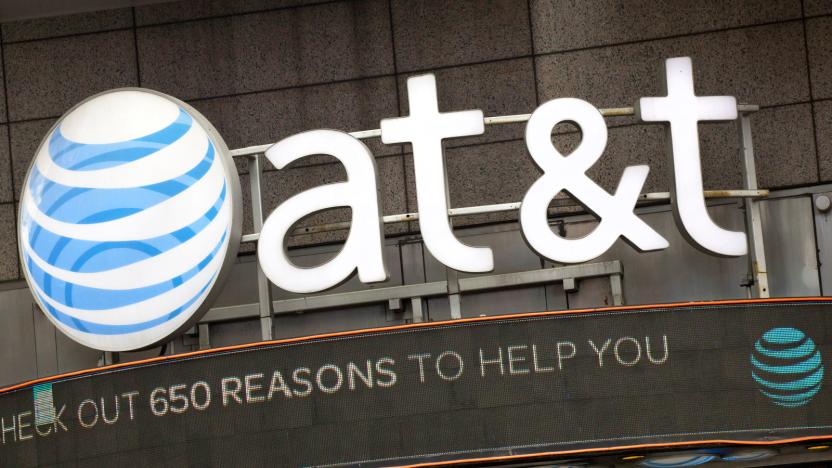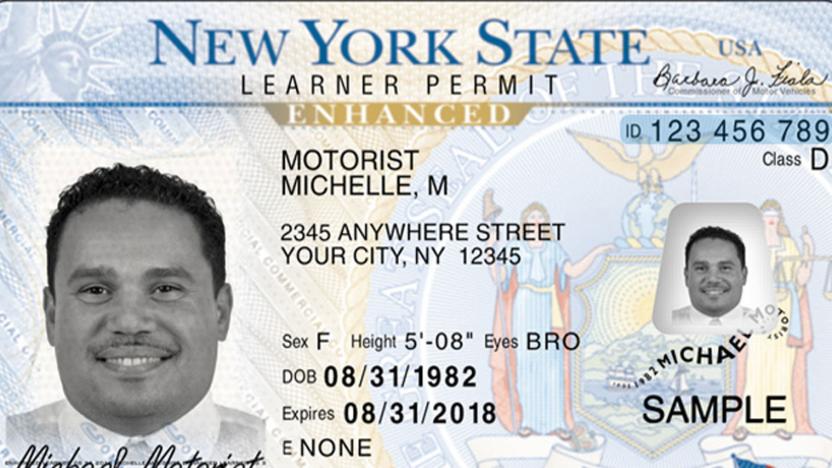fraud
Latest

Google gets better at spotting bogus Play Store app installs
It'd bad enough when you download a crummy Android app, but it's worse when you're tricked into installing that app thanks to fake installs and other tricks that make it seem more popular than it is. Google wants to fix that: it's deploying upgraded detection and filtering tech that should do a better job of catching installs meant solely to pump up an app's placement in the Play Store. Developers won't immediately get the boot if they're caught (rookie developer may not fully understand the rules), but those who make a habit of rigging the system could lose their app presence.

AT&T reportedly spies on its customers for government cash
AT&T controls a big chunk of America's cellular infrastructure, and it turns out that it's been using that power for super-creepy purposes. The Daily Beast is reporting that the telco has essentially turned itself into a spy-for-hire in the pay of the government. According to the piece, the company's Project Hemisphere is providing warrantless surveillance, thanks to some legal gray areas, that score it millions of dollars from taxpayers.

A second hacking group is targeting bank systems
It's bad enough that one hacker group has been wreaking havoc on banking systems worldwide, but it's apparently getting worse. Security firm Symantec reports that a second group, Odinaff, has infected 10 to 20 of its customers with malware that can cover up bogus money transfer requests sent through the ubiquitous SWIFT (Society for Worldwide Interbank Financial Telecommunication) messaging system. Most of the attacks targeted Australia, Hong Kong, the UK, the Ukraine and the US. And unlike the initial attackers, Odinaff appears to be a criminal organization (possibly linked to the infamous Carbanak team) rather than a state-sponsored outfit.

Thieves find a more insidious way to steal credit card details
The secret service has issued a warning to banks and ATM companies about a new way that thieves can steal your credit card information. A report from Krebs on Security explains that "periscope" skimmers have been found inside teller machines in Connecticut and Pennsylvania in the last two months. Of course, since the devices attach to the internal mechanism, there's absolutely no way for an end user to tell if they're at risk.

New York's smarter face recognition catches more ID thieves
Sometimes, behind-the-scenes tech upgrades can make a big difference. New York's Governor Cuomo reports that an overhaul of the state DMV's face recognition software in January has led to more than 100 arrests and 900 open investigations so far. The trick? The new system checks 128 points on a face instead of 64, dramatically increasing the chances that it'll match a photo against the DMV's database. Combine that with new comparison modes (like black-and-white and overlays) and it's easier to catch identity thieves and fraudsters, such as one man who tried to get a license with a stolen identity in order to evade a suspension.

Australia will track online money laundering and cyber fraud
Australia outlined its cyber security strategy earlier this year and now we have a better idea of what it entails. In an effort to figure out where funding for cyberterrorism comes from, the country has launched a program to keep track of money laundering and online financial fraud, according to Reuters. The key directive, at least at this point, is to intercept job listings that trick people into illegally moving money between one jurisdiction and the next.

AT&T ordered to pay $7.75 million for bogus directory assistance tools
US telecom providers have a pretty bad rap, and today we're finding out that some AT&T customers ended up paying money they shouldn't have thanks to some scammers. The FCC just released a statement noting that it reached a settlement with AT&T in which the carrier will pay $7.75 million after it accidentally allowed scammers to charge $9 a month to unsuspecting wireline customers for a "sham" directory assistance service. Adding insult to injury, it seems this service was set up as a tool to help launder money; the scam was originally uncovered by the DEA.

Game studio claims it lost $450,000 to key resales
Game key resales are theoretically ideal for players -- you can buy that must-have title at a discount from someone who wasn't going to use it anyway. However, SpeedRunners publisher TinyBuild would beg to differ. It's accusing G2A of facilitating a black market in game keys that amounted to $450,000 in potential lost sales at retail prices. The studio maintains that G2A is refusing proper help (including compensation) after fraudsters bought keys from the TinyBuild store using stolen credit cards and posted them on G2A, making a tidy profit while TinyBuild made nothing. Supposedly, the only way to get help would be to forge a deal with G2A itself and undercut its own retail partners in order to compete with the bootleggers. Simply blacklisting a range of keys wasn't an option, either.

PayPal won't refund a Twitch troll's $50,000 in donations
An Australian teen is learning one of the many reasons why you shouldn't cause grief for Twitch streamers. PayPal has refused to refund Anthony Archer after he made a total of $50,000 in donations to several well-known Twitch users (including LegendaryLea and NoSleepTV) as part of a trolling scheme. He'd intended to cancel the transactions through PayPal a month after making them, leaving the streamers high and dry, but PayPal wasn't having any of it -- he's on the hook for the full amount. And given that he appears to have used his parents' credit card, he's in more than a little trouble with them, too.

Florida man gets four years in prison for selling Vitamixes on eBay
41-year-old Kevin Wain, of Tampa, Florida, has been sentenced to four years in federal prison for running a credit card fraud operation that netted him more than $881,000 over the course of three years. Using counterfeit credit cards -- made with with a magnetic card reader/writer that he'd bought on eBay -- Wain bought hundreds of high-end home goods at Williams Sonoma and Bed, Bath & Beyond stores that he would turn around and sell for profit on eBay.

The Milwaukee Bucks fell prey to a phishing email scam
Just because you're part of a major league sports team doesn't mean you're immune to internet fraudsters. The Milwaukee Bucks have confirmed that they fell victim to a phishing scam that compromised the basketball team's financial data. After receiving an email impersonating team president Peter Feigin, an employee sent out 2015 tax year data for all of the Bucks' employees, including players. Yes, that means that the salaries and social security numbers of some NBA athletes are in sinister hands.

Court awards $20 million in YouTube channel dispute
YouTube channels can be tremendous things when everything goes according to plan, but things can get really, truly ugly when their creators disagree with each other. Brandon Keating and David "Ty" Moss have won both a $20 million award and controlling interest in a YouTube channel (VideoGames) after suing their former partners in the project, Brian Martin and Marko Princip. Allegedly, Martin and Princip committed fraud by reneging on a 2012 agreement that gave Keating and Moss partial control over and revenue from VideoGames' videos. The defendants not only avoided making payments, according to the lawsuit, but kept the plaintiffs entirely out of the loop -- at one point, Princip even handed control of the channel to a child without telling Keating or Moss what happened.

Wendy's looks into claims of a credit card data breach
If you grabbed a bite to eat at a Wendy's (you know, the other other big burger chain) using a credit or debit card, you might want to check your financial statements. The restaurant tells security guru Brian Krebs that it's investigating reports of a possible card data breach that let fraudsters go on spending sprees. It's not clear just how far-reaching the incident might have been, but Wendy's says that it did get reports of "unusual activity" on cards that had recently been used at "some" of its locations. Let's just hope the damage is limited -- the last thing Americans need is yet another large-scale intrusion that leaves millions of people vulnerable. [Image credit: AP Photo/Michael Dwyer]

Chrome gaming add-ons steal your Steam inventory
Beware browser add-ons that promise to boost your Steam-based games -- you might be in for a rude surprise. Security gurus have spotted a known scammer offering Chrome extensions that claim to change your Counter-Strike: Global Offensive theme or help you gamble, but do nothing more than steal from your Steam inventory. It's not the greatest loss if you're a victim (the malware isn't compromising the games or your Steam account), but it'll probably leave you crestfallen if you spent ages collecting rare virtual objects.

Renault recalls 15,000 vehicles following emissions raids
Groupe Renault is recalling 15,000 of its vehicles in the wake of the Volkswagen emissions scandal. French authorities publicly shone a light on the carmaker last week when fraud investigators swarmed multiple sites. Despite passing lab tests, it's said that the vehicles did not meet emissions standards in some real-world conditions.

Is Renault facing its own emissions scandal? (updated)
An AFP report, syndicated by The Telegraph, claims that Renault could be facing a Volkswagen-style emissions scandal of its very own. Representatives from the CGT Renault union are claiming that the French car maker's offices were raided by the nation's anti-fraud office last week. The suggestion is that authorities from the agency were interested in the engine control units that are fitted to certain cars. In addition, the personal computers of several directors were seized. Naturally, this news has had a disastrous effect on Renault's share price, with Bloomberg reporting that the potential scandal has caused a fall of 20 percent.

Lumosity settles claims it misled you over 'brain training'
Did you see the endless wave of Lumosity brain training ads and think there was no way that a bunch of games could significantly improve your mind? You're not alone. The brand's parent company, Lumos Labs, is paying the Federal Trade Commission $2 million to settle charges that it misled customers with bogus claims about Lumosity's abilities. The FTC doesn't beat around the bush: it says there's no evidence to support talk of boosting your intellectual performance. Moreover, Lumosity doesn't disclose that many of its testimonials are solicited through contests, and its ads "preyed on consumers' fears" about aging.

LifeLock forced to pay $100 million FTC fine
LifeLock is a company that purports to provide protection for people at risk of identity theft in exchange for a monthly fee of $10. The FTC doesn't feel that the firm does enough to justify that fee, which is why it's slapped the business with a $100 million fine. Officials believe that LifeLock has been exaggerating the extent of its services, saying that it hasn't done enough -- or anything -- to protect personal data like social security, credit card and bank account numbers. It's not the first time that LifeLock has been told off by the FTC after being found guilty of exaggerating its services in 2012 and failing to protect its customers in 2012.

Kickstarter: 9 percent of crowdfunding projects don't deliver
You've no doubt heard of failed Kickstarter projects that left backers hanging, but how often do these implosions happen, really? They're not as common as you might think. The crowdfunding platform has posted an independent study showing that 9 percent of Kickstarter projects don't deliver their rewards -- a significant number, but not necessarily a systemic flaw. The findings also show that 8 percent of money goes toward these fallen projects, and that the rates tend to be consistent among categories. Tech projects are about as likely to go bust as crafts and movies, in other words.

Fantasy sports staff earned obscene cash by playing on rival sites
Those suspicions that DraftKings and FanDuel employees are profiting from being a little too cozy? Yeah, they've just gained some serious credibility. On top of a recent lawsuit accusing the two websites of using insider information to commit fraud, the New York Times has learned that staff at these sites have frequently been raking in huge amounts of cash by playing on each other's sites. Both DraftKings and FanDuel workers have "regularly" ranked as big winners, possibly by using that insider info to gain an unfair advantage. DraftKings co-founder Paul Liberman even noted that some of his team members have made "significantly more money" from competing at FanDuel than they have working their jobs. Taking that option away might discourage people from staying with the company, he claimed.




